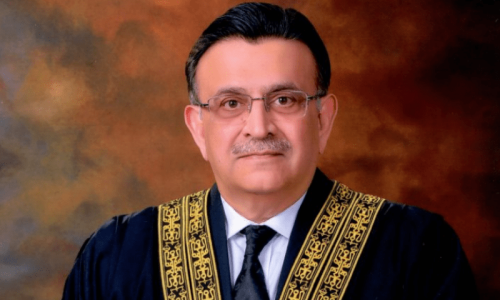ISLAMABAD: The government informed the Supreme Court on Wednesday that the Aug 2022 amendments to the National Accountability Ordinance (NAO) by former prime minister Imran Khan had not created a “class of its own” for taking advantage of the law.
“Seeing the chart provided by the National Accountability Bureau (NAB) about the cases against parliamentarians which stand abated after the amendments, the answer is that no class has emerged,” argued senior counsel Makhdoom Ali Khan, who is defending the amendments on behalf of the federal government before a three-judge SC bench hearing the challenge to amendments to the NAB law.
The counsel was trying to establish that the number of parliamentarians in the list provided by NAB is neither very large nor small compared to other accused, including bureaucrats and businessmen.
The arguments came when Justice Syed Mansoor Ali Shah wondered whether the court could say that a new class has emerged for taking benefit of the accountability law after the amendments.
Accountability watchdog says Toshakhana references against Gilani, Nawaz and Zardari returned after amendments
Chief Justice of Pakistan (CJP) Umar Ata Bandial, who heads the bench, observed that the Supreme Court had applied the doctrine of living tree in a recent opinion on a presidential reference seeking interpretation of Article 63A of the Constitution, which deals with defection.
But the counsel emphasised that the apex court had in a number of judgements repeatedly used the concept by describing the Constitution as a “living or organic document”, explaining that the living tree idea was not something unique or extraordinary; it’s a Canadian concept that says that the constitution is organic and must be read in a broad and progressive manner to be adapted to the changing times.
The CJP observed that from 1999 onward and during the era of former chief justice Iftikhar Mohammad Chaudhry, “we have witnessed certain experiences as a result of which a new concept emerged under which the jurisdiction of the Supreme Court was enhanced by giving the judiciary vast powers of striking down any statute not necessarily on the touch stone of violations of the fundamental rights, but even if it was enacted in derogation of any of the provision of the Constitution”.
Then why the court should not subscribe to the new concept, he wondered.
The counsel contended that the constitutional view by courts had always been consistent in which the apex court, instead of simply striking down a statute, identified first the provision of the Constitution which had been violated through a statute and then tried to reconcile it with the law and the Constitution, emphasising that no one was arguing before the Supreme Court that legislators could enact a law to take away any jurisprudence of the courts.
Toshakhana references
Meanwhile, in a detailed report furnished by Additional Prosecutor General Mumtaz Yousaf, NAB told the Supreme Court that after the 2022 amendments to the accountability law, Toshakhana references against former prime ministers Yousuf Raza Gilani and Nawaz Sharif and former president Asif Ali Zardari had been returned since after the amendments, the jurisdiction of accountability courts was taken away.
Likewise, the report said, through ordinances promulgated during the last PTI government or the amendments made by the current PDM government in 2022, a number of references instituted by NAB were either abated or returned due to a lack of jurisdiction of accountability courts.
These references were instituted against PPP parliamentarian Haji Saifullah Khan Bangash, former PM Raja Pervaiz Ashraf, Yousuf Raza Gilani, former finance minister Shaukat Tareen, Gilgit-Baltistan Legislative Assembly member Javed Hussain, former PM Shaukat Aziz, former water and power minister Liaquat Ali Khan Jatoi, former GB health minister Haji Gul Bar Khan, Minister for Special Initiatives Lal Mohammad Khan, former MNA Farzana Raja, Asif Zardari, senators Abdul Qadir, Robina Khalid and Yousuf Baloch and Senate Deputy Chairman Saleem Mandiwalla.
A reference against Malik Riaz of Bahria Town (Pvt) Ltd in Bagh Ibn-i-Qasim case was also returned on Dec 1, 2022 following the amendments to the NAB law.
NAB, however, said it will soon furnish an updated report explaining in clear terms about the information being sought by the court and also explaining how much money was recovered by the bureau through plea bargain and where it was spent.
During the hearing, Justice Mansoor Ali Shah wondered whether the court could act when a law was made in a colourable exercise or on the basis of malice, though it did not violate any fundamental rights.
Counsel Makhdoom Ali Khan contended that it was the easiest thing to point allegation of mala fide against someone but to prove it was the most difficult thing. He emphasised that the apex court had to find a pivot in the Constitution to strike down the legislation since annulling the law on the grounds of Islamic ethos or for violating Islamic injunctions will not suffice.
This is what the Supreme Court did while striking down the NRO in Dr Mubashir Hassan case in 2010 by holding that the ordinance was introduced in derogation of Article 25 of the Constitution which ensures equality of all citizens, and not merely on the grounds that it violated the Islamic concept, the counsel argued.
Published in Dawn, February 9th, 2023













































Dear visitor, the comments section is undergoing an overhaul and will return soon.